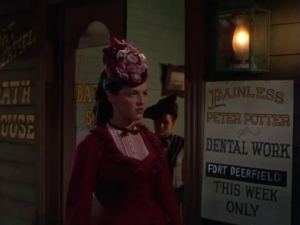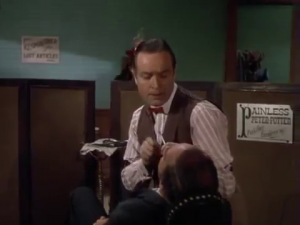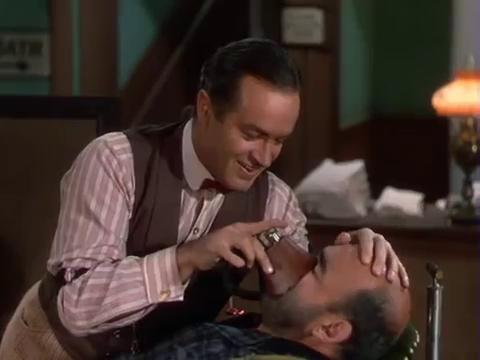The Painless Peter Potter Principle
 In 1948, Bob Hope and Jane Russell starred in the movie “The Paleface.” Hope’s character in the movie was “Painless Peter Potter,” a dentist whose selling point was that he used laughing gas to minimize the pain of treatment. What has this got to do with Epicurus?
In 1948, Bob Hope and Jane Russell starred in the movie “The Paleface.” Hope’s character in the movie was “Painless Peter Potter,” a dentist whose selling point was that he used laughing gas to minimize the pain of treatment. What has this got to do with Epicurus?
The burning question in modern debate about Epicurean philosophy is “What did Epicurus hold to be “the goal of life” or “the good“? Is it true, as some say, that Epicurus held the ultimate end of life is not “active” or “kinetic” pleasure, but rather “painlessness”? And is it true that Epicurus held that active pleasures – that which we think of as “joy and delight” – are valuable only for the sake of painlessness? The stakes in this debate are huge, and they are not merely semantic. Did Epicurus endorse a life of total retirement and contemplation, in a garden walled off from the outside world? Or did Epicurus approve of engagement and action, when properly calculated to result in a life of maximized pleasures of all types? If Epicurus held “painlessness” to be the goal of life, it is hard to image how he could have advised the latter. Let’s look at the record:
Diogenes Laertius recorded that Epicurus valued both “active” and “static” pleasures:
He differs from the Cyrenaics with regard to pleasure. They do not include under the term the pleasure which is a state of rest, but only that which consists in motion. Epicurus admits both; also pleasure of mind as well as of body, as he states in his work On Choice and Avoidance and in that On the Ethical End, and in the first book of his work On Human Life and in the epistle to his philosopher friends in Mytilene.
So also Diogenes in the seventeenth book of his Epilecta, and Metrodorus in his Timocrates, whose actual words are: “Thus Pleasure being conceived both as that species which consists in motion and that which is a state of rest.” The words of Epicurus in his work On Choice are : “Peace of mind and freedom from pain are pleasures which imply a state of rest; joy and delight are seen to consist in motion and activity.”
This would seem to be a clear endorsement of the active pleasures of joy and delight, which arise from motion and activity, as part of the goal of living. Nevertheless, the proponents of “painlessness” as the goal of life can cite a number of important passages in support of their view that active pleasure is a distraction at worst, and at best a means of achieving painlessness. First, from Epicurus’ letter to Menoeceus:
For the end of all our actions is to be free from pain and fear, and, when once we have attained all this, the tempest of the soul is laid; seeing that the living creature has no need to go in search of something that is lacking, nor to look for anything else by which the good of the soul and of the body will be fulfilled. When we are pained because of the absence of pleasure, then, and then only, do we feel the need of pleasure.
….
When we say, then, that pleasure is the end and aim, we do not mean the pleasures of the prodigal or the pleasures of sensuality, as we are understood to do by some through ignorance, prejudice, or willful misrepresentation. By pleasure we mean the absence of pain in the body and of trouble in the soul.
The painlessness proponents can also cite this from Cicero’s On Ends:
The pleasure we pursue is not that kind alone which directly affects our physical being with a delightful feeling,—a positively agreeable perception of the senses; on the contrary, the greatest pleasure according to us is that which is experienced as a result of the complete removal of pain.
And also Principal Doctrine Three:
3. The magnitude of pleasure reaches its limit in the removal of all pain. When such pleasure is present, so long as it is uninterrupted, there is no pain either of body or of mind or of both together.
Is this not massive evidence, which establishes beyond all doubt that Epicurus held painlessness to be the goal of life? My answer is “no, not at all” and here’s why:
First, let’s consider what else Epicurus has to say in his letter to Menoeceus:
So we must exercise ourselves in the things which bring happiness, since, if that be present, we have everything, and, if that be absent, all our actions are directed towards attaining it.
Can “painlessness” be substituted for “happiness” in that sentence? It may seem odd to suggest that “all our actions are directed towards attaining painlessness,” but for the sake of argument let’s say: possibly so. Further:
The wise man does not deprecate life nor does he fear the cessation of life. The thought of life is no offense to him, nor is the cessation of life regarded as an evil. And even as men choose of food not merely and simply the larger portion, but the more pleasant, so the wise seek to enjoy the time which is most pleasant and not merely that which is longest.
Can “painlessness” be substituted for “pleasant” here? Do we choose our actions so that the result will be “more painless?” Do we seek to enjoy the time which is “most painless and not merely that which is longest“? Perhaps. Again the construction seems odd, but those who advocate the painlessness position are essentially arguing that Epicurus is playing artfully with words, so perhaps this passage can be reconciled too. Further:
And he who admonishes the young to live well and the old to make a good end speaks foolishly, not merely because of the desirability of life, but because the same exercise at once teaches to live well and to die well. Much worse is he who says that it were good not to be born, but when once one is born to pass quickly through the gates of Hades. For if he truly believes this, why does he not depart from life? It would be easy for him to do so once he were firmly convinced.
Here Epicurus is saying clearly that life is desirable, and that it is worse than foolish to assert that it would be better not ever to have been born. And we are to believe that he is saying this because “painlessness” is desirable in and of itself? “Painlessness” alone is what is better than never being born? Perhaps…… Further:
Wherefore we call pleasure the alpha and omega of a blessed life. Pleasure is our first and kindred good. It is the starting-point of every choice and of every aversion, and to it we come back, inasmuch as we make feeling the rule by which to judge of every good thing.
So the rule by which we judge every good thing in the end comes down to “painlessness?” We judge sex, the taste of food, the beauty of a sunset, and the smell of a rose on a scale of how it compares to “painlessness“? So far, the constructions are strained, but possible, if Epicurus, the great advocate of clarity in speaking, is playing games with words. But here is a more difficult passage for the “painlessness” proponents:
And since pleasure is our first and native good, for that reason we do not choose every pleasure whatsoever, but will often pass over many pleasures when a greater annoyance ensues from them. And often we consider pains superior to pleasures when submission to the pains for a long time brings us as a consequence a greater pleasure. While therefore all pleasure because it is naturally akin to us is good, not all pleasure is should be chosen, just as all pain is an evil and yet not all pain is to be shunned. It is, however, by measuring one against another, and by looking at the conveniences and inconveniences, that all these matters must be judged. Sometimes we treat the good as an evil, and the evil, on the contrary, as a good.
If our goal is painlessness, is it really coherent to suggest that we would ever voluntarily choose pain? Is this just sloppy thinking on Epicurus’ part, or is it logical to believe that it makes sense to care about how much time we spend in a state of “painlessness“? Can we conclude that we have lived well solely by achieving the longest possible time in a state of painlessness?
Again, we regard independence of outward things as a great good, not so as in all cases to use little, but so as to be contented with little if we have not much, being honestly persuaded that they have the sweetest enjoyment of luxury who stand least in need of it, and that whatever is natural is easily procured and only the vain and worthless hard to win. Plain fare gives as much pleasure as a costly diet, when once the pain of want has been removed, while bread and water confer the highest possible pleasure when they are brought to hungry lips. To habituate one’s self, therefore, to simple and inexpensive diet supplies all that is needful for health, and enables a man to meet the necessary requirements of life without shrinking, and it places us in a better condition when we approach at intervals a costly fare and renders us fearless of fortune.
Why would Epicurus ever mention “the sweetest enjoyment of luxury” as desirable if “painlessness” is the sole goal of life? Why would we ever wish to “approach at intervals a costly fare” if bread and water are totally sufficient to achieve painlessness?
And let’s not forget about Vatican Saying 63: “63. There is also a limit in simple living, and he who fails to understand this falls into an error as great as that of the man who gives way to extravagance.” How does one reconcile this to the “painlessness” standard?
I submit that what is going on in the passages cited above is that the Epicurean doctrine all pleasures are desirable was so firmly established that there was no possibility of misconstruing painlessness alone as the goal of life. Once the foundation was laid that all pleasures are desirable, all discussion of painlessness had to be taken in that context. In the context that pleasurable living (whether that activity be physical or mental, kinetic or katastematic, active or static) is the goal of life – all references to painlessness are geared to observing that pleasures – of any and every type – cannot be increased in purity past the point where they are unaccompanied by any amount of pain.
Epicurus was nothing if not a logical, step-by-step thinker, and his philosophy is chain-linked all the way back to observing that “nothing comes from nothing.” Once established, foundational principles are not to be forgotten, and it is part of the Canon of Truth that pleasure is given by Nature as the judge of that which is to be desired and chosen. Given this foundation, Epicurus would never shift the focus away from the presence of active pleasurable living and place it on the absence of pain.
In Epicurean philosophy, divine pleasure is the ever-present guide to life. Epicurus calls us to a life of continuous pleasure. Pain, on the other hand, is not continuous. Pain is the intermittent harsh sensation which does not last long, and serves merely to subtract from the pleasant activities of life, to the extent that it (pain) is present at all. From the Epicurean viewpoint, the focus is always on, and never departs from, the happy experience of enjoying whatever pleasurable experience is possible, under the applicable circumstances, for the particular individual.
Thus the goal is never painlessness per se. Rather, the goal is the successful experience and continuation of whatever pleasurable activities are possible and available without undue pain. Types and intensities of pleasure are innumerable, and vary by individual, and Epicurus is never concerned about giving advice that one type of pleasure is intrinsically more desirable than another. Why would Epicurus depart from that foundation to endorse a view that one particular experience of pleasure is the same, and the highest, for all individuals at all places, times, and circumstances? The answer is that he was not. Epicurus was not defining painlessness as some time of transformational state akin to Stoic virtue or religious redemption. Epicurus was concerned with painlessness only as a measure of whether the pleasures being experienced by the individual were being experienced in the purest form possible, undiluted by any degree of pain. The focus never shifts to painlessness, but always remains on the experience of the positive pleasures of life, which are best experienced – experienced at their highest – when undiminished by any degree of pain.
In Cicero’s “On Ends,” Torquatus says:
We esteem the art of medicine not for its interest as a science, but for its conduciveness to health; the art of navigation is commended for its practical and not its scientific value, because it conveys the rules for sailing a ship with success. So also Wisdom, which must be considered as the art of living, if it effected no result would not be desired; but as it is, it is desired, because it is the artificer that procures and produces pleasure.
Those who contend that Epicurus held the ultimate end of life to be painlessness contend that this argument amounts to “the art of wisdom is the art of living and is desired because it produces painlessness.” But the problem with the “painlessness” argument is that it has no positive content. We rightly recoil at the idea of defining the goal as a negative – the absence of something. The goal of living – which is, after all, desirable according to Epicurus – must be defined in terms of a positive. Qualities of bodies result from combinations of atoms and void – never from void alone – for nothing can come from nothing.
I submit that Torquatus gives us at least two examples of how to apply this perspective properly:
First, in Chrysippus’ riddle of the hand, Torquatus asserts that “And the reason why it [the hand] would not have wanted pleasure is that to be without pain is to be in a state of pleasure.” Viewed from the “painlessness” perspective, some might assert hat the hand was in this mysterious state of highest possible pleasure. But Torquatus did not argue that point, and the reason he did not is that the state of painlessness was never intended to represent a mystical state which all living things should seek to attain as the goal of life. The state of painlessness was relevant to the hand only because it was descriptive of the optimum functioning possible to a hand while unimpeded by pain.
A second example comes in Torquatus’ description of the happiest man:
Let us imagine a man living in the continuous enjoyment of numerous and vivid pleasures alike of body and of mind, undisturbed either by the presence or by the prospect of pain: what possible state of existence could we describe as being more excellent or more desirable? One so situated must possess in the first place a strength of mind that is proof against all fear of death or of pain; he will know that death means complete unconsciousness, and that pain is generally light if long and short if strong, so that its intensity is compensated by brief duration and its continuance by diminishing severity. Let such a man moreover have no dread of any supernatural power; let him never suffer the pleasures of the past to fade away, but constantly renew their enjoyment in recollection, and his lot will be one which will not admit of further improvement.
There is no way that this is description of painlessness as the goal of life. It is instead a description of the goal as Epicurus truly intended it to be understood: continuous enjoyment of numerous and vivid pleasures alike of body and of mind, undisturbed either by the presence or by the prospect of pain.
This state of pleasure is not relevant to or possible to a hand, which has no mind, but it is relevant to and possible to a man. Regardless of the organism involved, the focus is on the purest active enjoyment of whatever pleasures are possible to that organism, coupled with, and not defined by, the absence of pain.
And now it is finally time to turn to Painless Peter Potter. As a sedation dentist, Peter Potter promoted “painlessness” to his stock in trade. Implicit in this marketing scheme was both (1) that the extraction of teeth or filling of cavities would be done painlessly, and (2) that the teeth themselves would be restored to a state of painlessness.
But behind all that advertising – unstated but of supreme importance – was this: the goal of dentistry is to restore teeth to their active healthy state of use for eating and living. The goal of dentistry not “painlessness,” except in a narrow and restricted sense that a healthy mouthful of teeth operates totally without pain.
To Epicurus, the unstated but supremely important concept behind his entire philosophy is that the goal of life is the experience of active pleasurable living. The goal of life is not “painlessness,” except in the narrow and restricted sense that active pleasurable living is best experienced when it is coupled with the total absence of pain.
Regardless of how this dispute over painlessness arose, a fair reading of the overall thrust of Epicurean philosophy demands that pleasure as the guide of life be understood in a way that harmonizes the whole. It does no justice to Epicurus, and gives little credit to ourselves, to end our analysis with a conclusion that Epicurus asserted positions that fly in the face of common sense and experience.
Cicero is recorded to have written to Cassius Longinus, teasing him about his conversion to Epicurean philosophy:
So even if it is now two or three years since, bewitched by the blandishments of Pleasure, you sent a notice of divorce to Virtue, I am free to act as I like. And yet to whom am I talking? To you, the most gallant gentleman in the world, who, ever since you set foot in the forum, have done nothing but what bears every mark of the most impressive distinction. Why, in that very school you have selected I apprehend there is more vitality than I should have supposed, if only because it has your approval.
Once the false notion of “painlessness” as the goal of life is dispelled, it can be seen that the Epicurean school has much more vitality in it than many commentators may suppose.
—————————————–
Note: No reference to Painless Peter Potter would be complete without a clip of his Academy-Award-winning song – “Buttons and Bows”:

